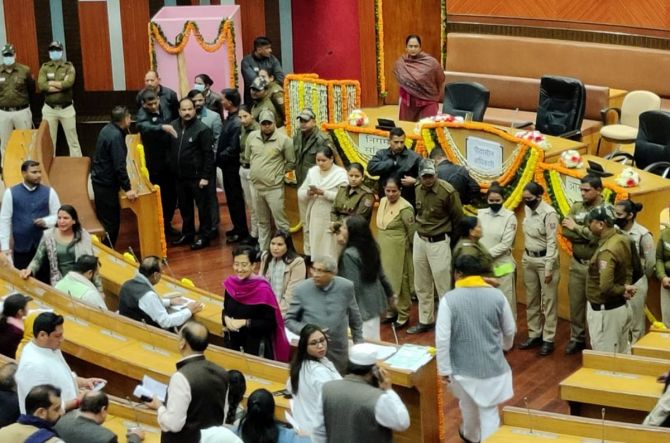
Supreme Court to hear AAP’s petition on Delhi mayor election tomorrow

With the Supreme court agreeing to hear on Wednesday a petition filed by Aam Aadmi Party’s mayoral candidate Shelly Oberoi and others for holding mayoral and deputy mayoral elections in the MCD in a time-bound manner, all eyes will now be on the apex court to end the logjam and kickstart civic body’s functioning.
Unlike the previous two occasions, when administering oath to aldermen (nominated members) ahead of the elected councillors became the major point of discord leading to adjournments, Monday’s controversy centred around the decision by the presiding officer to allow nominated members to vote in the election for the mayor.
More than two months after the declaration of results for the MCD elections, the civic body hasn’t managed to finish the formal process of electing a mayor, deputy mayor and six members of the standing committee. Besides civic administration, the immediate challenge before the civic body is to clear the annual budget proposals worth more than Rs 16,000 crore and publish tax rates for the 2023-24 financial year by February 15.
One judgement, two interpretations
The repeated attempts by the presiding officer to allow aldermen to vote in the mayoral election has emerged as the main contention between the BJP and the AAP. Both parties are citing the Onika Malhotra judgement in support of their arguments. While the BJP has cited the same order to claim that 10 members nominated by LG have right to vote, whereas the AAP argues that the court allowed the aldermen to vote only in ward committees and not in House.
Also read: MCD passed civic body budget without keeping it in loop, alleges AAP
Until 2015, the nominated members had no voting rights in ward committees or in the House. However, this changed when then Congress councillor Onika Malhotra approached the court.
The settled part
While the Onika Malhotra judgement is being referred to for a wider interpretation by both the parties, there is a settled law which clearly lays down the absence of voting rights for nominated members in mayoral and deputy mayoral elections.
According to Article 243R of the Constitution, the legislature of the state may, by law, provide for the representation in a municipality of persons having experience or special knowledge, provided that the persons shall not have the right to vote in the meetings of the municipalities.
Going by Section 3 (b) (i) in Chapter II (Constitution of Corporation) of the Delhi Municipal Corporation Act, 1957, “Ten persons who are not less than 25 years of age and who have special knowledge or experience in municipal administration, to be nominated by the administrator, in Delhi’s case the LG…However, the nominated persons will not have the right to vote in the meetings of the corporation.”
Therefore, according to article 243 R of the Constitution, and as given in the proviso to Section 3 (b)(i) of the Delhi Municipal Corporation Act, 1957, the nominated members are not entitled to vote in the election of the mayor and deputy mayor.
Onika Malhotra judgement: The fine print
A single judge bench of the Delhi high court in 2015 ruled that the aldermen can vote as members of the ward committees. Justice Vibhu Bakhru, who delivered the verdict, said: “They cannot file their nomination for being elected as chairperson of the wards committee. They can also offer their candidature for being elected as member of the standing committee, and they may vote in meeting of the standing committee (if elected to the panel) but they cannot offer their candidature for being appointed as a chairperson of the standing committee.”
A constitutional issue
“The present dispute regarding the voting rights of nominated members earlier known as alderman, is not only a statutory but a constitutional issue. The judgment of the Delhi High Court in Onika Mehrotra vs State of Delhi, the Court has made interpretation to bring the distinction between committees formed under the Municipality and House of the Corporation,” said Rajesh Kumar, a constitutional expert.
Adding further, he said: “As far as the rights of nominated members to vote in the House of Municipality is concerned, it is explicitly barred under the provisions of Constitution as provided under proviso of article 243R(2)(a) and state legislation has incorporated the same in section 3(3)(b)(i) of the DM act, 1957, in conformity with the constitutional mandate. Therefore, a different interpretation, if any, would only possible if a different context of the act shall be raised before the apex court. Let the time be a witness for it.”
Also read: No Delhi mayor polls again as big change in voting sparks protest
BJP’s “grey area”?
Many BJP insiders, insisting on confidentiality, have expressed that the mere fact that the nominated members are allowed to vote in standing committee election and not for posts such as mayor and deputy mayor needs a fresh relook and an immediate correction. Reiterating the Delhi High Court order, they said the order clearly states that nominated councillors will also be members of the House and can also partake in election of the standing committee.
The AAP has a majority in the MCD House, with 134 councillors, while the BJP and the Congress have 105 and 9 councillors each, respectively.


